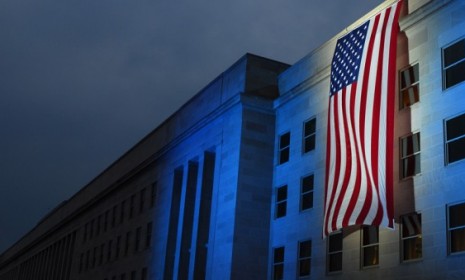'Top Secret America': By the numbers
After 9/11, the government bulked up its national security network many times over, reports The Washington Post. Nine years later, it is a sprawling beast without order or direction

A free daily email with the biggest news stories of the day – and the best features from TheWeek.com
You are now subscribed
Your newsletter sign-up was successful
It took two years and the help of over a dozen journalists to complete, but The Washington Post has finally published the first of a series of investigative reports into the sprawling build-up of national security agencies and contractors in the wake of 9/11. "After nine years of unprecedented spending and growth, the result is that the system put in place to keep the United States safe is so massive that its effectiveness is impossible to determine," write Dana Priest and William H. Arkin. (Watch a promo for "Top Secret America.") Here are just a few of the key numbers unearthed by the newspaper's team of reporters:
Approximately 854,000 people, "nearly 1.5 times as many people as live in Washington D.C." have top-secret security clearances.
Buildings housing top-secret intelligence workers completed or under construction since 9/11 occupy 17 million square feet of space in Washington and surrounding areas, "the equivalent of almost three Pentagons."
The Week
Escape your echo chamber. Get the facts behind the news, plus analysis from multiple perspectives.

Sign up for The Week's Free Newsletters
From our morning news briefing to a weekly Good News Newsletter, get the best of The Week delivered directly to your inbox.
From our morning news briefing to a weekly Good News Newsletter, get the best of The Week delivered directly to your inbox.
"At least" 263 government organizations have been created or reorganized as a response to 9/11. In total, 1,271 government agencies work on counterterrorist, homeland security and intelligence programs in the U.S.
Around 1,931 private contractors work with government organizations on homeland security and counterterrorist programs — 484 companies alone work with the National Security Agency. Even the Coast Guard outsources work to as many as 44 private contractors.
Every day, the National Security Agency intercepts and stores 1.7 billion e-mails, phone calls and "other types of communications." It is able to sort a "fraction" of these into 70 separate databases.
Read the "Top Secret America" investigation in The Washington Post.
A free daily email with the biggest news stories of the day – and the best features from TheWeek.com
-
 Political cartoons for February 21
Political cartoons for February 21Cartoons Saturday’s political cartoons include consequences, secrets, and more
-
 Crisis in Cuba: a ‘golden opportunity’ for Washington?
Crisis in Cuba: a ‘golden opportunity’ for Washington?Talking Point The Trump administration is applying the pressure, and with Latin America swinging to the right, Havana is becoming more ‘politically isolated’
-
 5 thoroughly redacted cartoons about Pam Bondi protecting predators
5 thoroughly redacted cartoons about Pam Bondi protecting predatorsCartoons Artists take on the real victim, types of protection, and more
-
 The billionaires’ wealth tax: a catastrophe for California?
The billionaires’ wealth tax: a catastrophe for California?Talking Point Peter Thiel and Larry Page preparing to change state residency
-
 Bari Weiss’ ‘60 Minutes’ scandal is about more than one report
Bari Weiss’ ‘60 Minutes’ scandal is about more than one reportIN THE SPOTLIGHT By blocking an approved segment on a controversial prison holding US deportees in El Salvador, the editor-in-chief of CBS News has become the main story
-
 Has Zohran Mamdani shown the Democrats how to win again?
Has Zohran Mamdani shown the Democrats how to win again?Today’s Big Question New York City mayoral election touted as victory for left-wing populists but moderate centrist wins elsewhere present more complex path for Democratic Party
-
 Millions turn out for anti-Trump ‘No Kings’ rallies
Millions turn out for anti-Trump ‘No Kings’ ralliesSpeed Read An estimated 7 million people participated, 2 million more than at the first ‘No Kings’ protest in June
-
 Ghislaine Maxwell: angling for a Trump pardon
Ghislaine Maxwell: angling for a Trump pardonTalking Point Convicted sex trafficker's testimony could shed new light on president's links to Jeffrey Epstein
-
 The last words and final moments of 40 presidents
The last words and final moments of 40 presidentsThe Explainer Some are eloquent quotes worthy of the holders of the highest office in the nation, and others... aren't
-
 The JFK files: the truth at last?
The JFK files: the truth at last?In The Spotlight More than 64,000 previously classified documents relating the 1963 assassination of John F. Kennedy have been released by the Trump administration
-
 'Seriously, not literally': how should the world take Donald Trump?
'Seriously, not literally': how should the world take Donald Trump?Today's big question White House rhetoric and reality look likely to become increasingly blurred